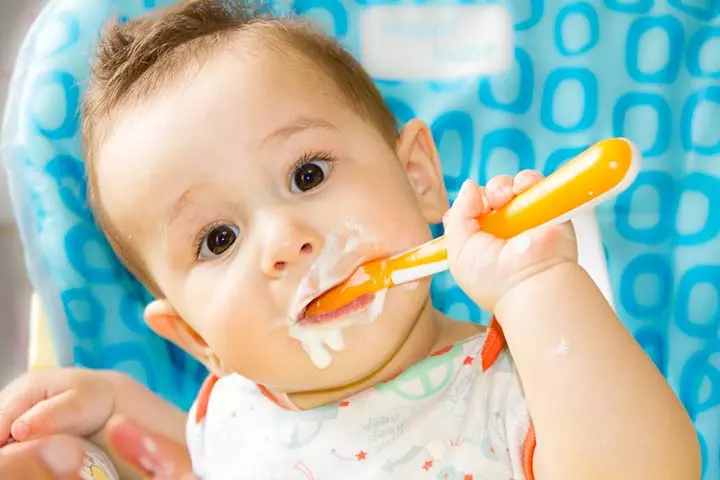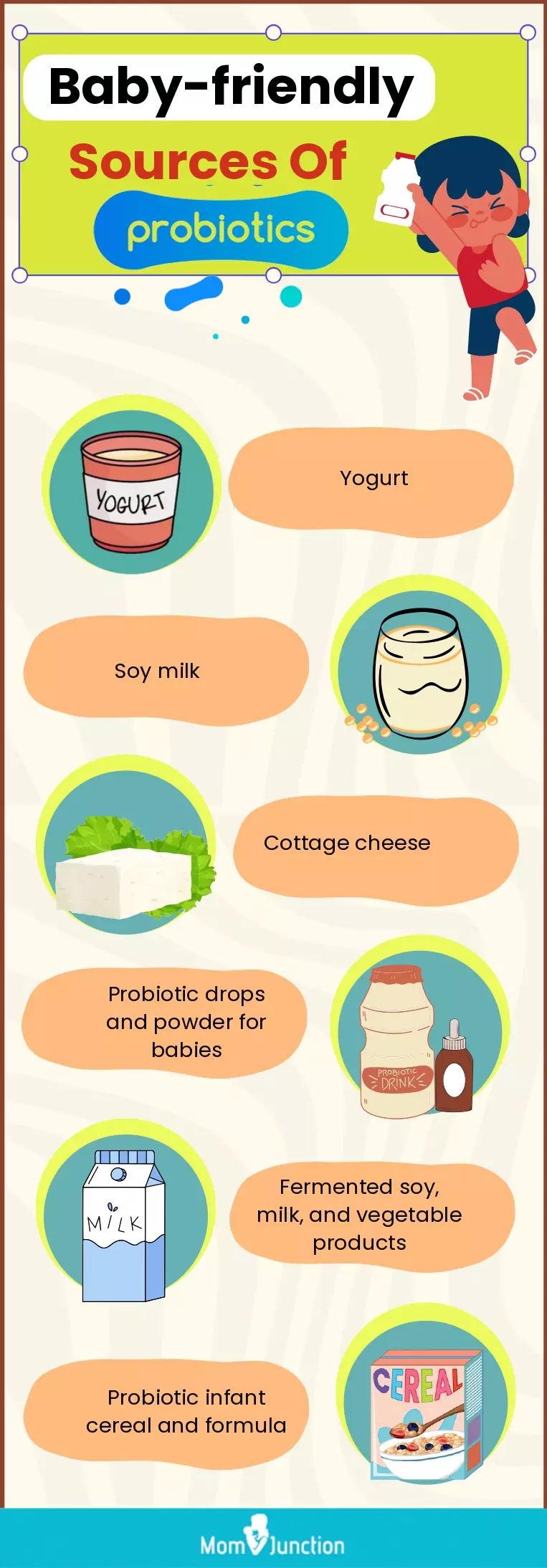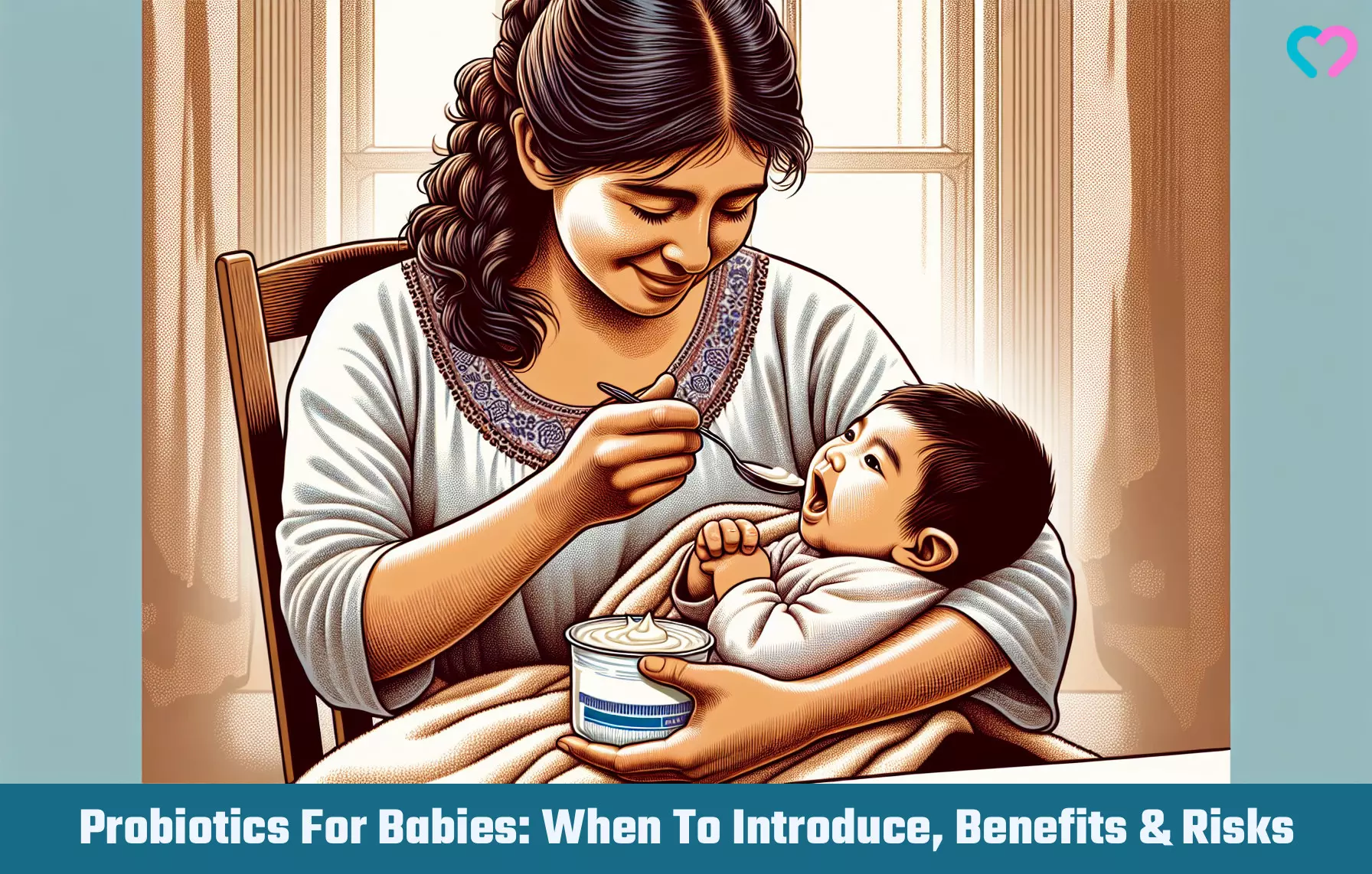When To Introduce, Benefits & Risks


Babies frequently experience a number of gastrointestinal issues, ranging from a brief stomach ache to constipation and diarrhea. Several treatments are available to help with these issues, but probiotics for babies stand out among them. Probiotics are “good” microorganisms that help repair a malfunctioning digestive tract. Adults love probiotics, but are they safe to use for babies? Read this post to get answers to this query and other details on probiotics for infants.
What Are Probiotics?
Probiotics are live bacteria similar to those naturally found in our gut, previously known as “intestinal flora” but more recently referred to as microbiota or gut microbiome (1). Unlike infectious bacteria, probiotic bacteria are the “good” or “friendly” bacteria that restore the population of existing bacteria in the gut. Two genera of bacteria are categorized as probiotics, as they come from the genus Lactobacillus and Bifidobacterium.
There are multiple species of bacteria in each genus, each with various strains. These probiotic bacteria can be found naturally in several foods and are also present in commercially sold probiotic products.
 Quick fact
Quick fact
How Are Probiotics And Prebiotics Different From Each Other?
Both probiotics and prebiotics for babies are advantageous for the gut microbiome, each playing distinct roles in supporting the same process through different mechanisms. Probiotics consist of living bacterial strains that contribute to the ‘good bacteria’ population in the gut. In contrast, prebiotics are non-digestible plant fibers that serve as a source of nourishment for the healthy bacteria residing in the gut, thereby promoting the growth and activity of probiotics (2) (3) (4).
What Are The Sources Of Probiotics For Babies?
Here are the best sources of probiotics for your baby (5):
Image: Shutterstock
- Probiotic infant cereal
- Probiotic infant formula
- Soy milk
- Cottage cheese
- Probiotic drops and powder for babies
- Fermented soy, milk, and vegetable products
 Things to know
Things to knowBabies above six months can also get probiotics from foods, such as buttermilk and sourdough bread.
What Probiotics Are Present In Infant Formula?
The most common probiotic strains that are added to infant formulas include (6):
- Streptococcus thermophilus
- Lactobacillus reuteri (DSM 17938)
- Bifidobacterium breve (BC50)
- Bifidobacterium lactis (Bb12)
- Lactobacillus fermentum (CECT5716)
- Lactobacillus rhamnosus
The supplementation of infant formula with these beneficial probiotic strains contributes to your baby’s adequate growth and development by facilitating the effective digestion and absorption of essential nutrients and fluids.
When Can Babies Have Probiotics?
The source of the probiotic determines when your baby can have it. Here is the average age to introduce probiotics to the baby, depending on the different food sources:
- Yogurt: 12 months. You can try introducing it around the age of nine months (7) (8).
- Cottage cheese: 12 months
Image: Shutterstock
- Probiotic drops, infant formula, and infant cereal: Probiotic drops and infant formula may be available for babies as young as three months old. However, it is best to consult the doctor before giving probiotics to infants below the age of six months. Infants older than six months can safely have probiotic infant cereal, formula, and drops. Formulas containing probiotics are beneficial for formula-fed babies as they promote a balance of microorganisms in the intestines and reduce the growth of infection-causing organisms.
- Fermented soy, milk, and vegetable products: Several traditionally fermented products contain strains of Lactobacillus and Bifidobacterium. Examples of milk-based fermented products are kefir and some types of cheese. Miso and tempeh are fermented soy delicacies that are a dairy-free source of probiotic. Kimchi and Sauerkraut are preparations made by fermenting vegetables with bacteria.
Most cheeses and other fermented milk preparations can be safely introduced to babies at the age of 12 months.
Fermented soy and vegetable preparations can also be given at 12 months, but since they contain high quantities of sodium, consult a pediatrician before trying them.
How Do Probiotics Work?
Here is how probiotics usually work in infants (9):
- Topping up gut bacteria population: Sometimes infection or treatment with antibiotics may reduce the population of healthy intestinal bacteria. Probiotics help restore the good bacteria in the gut.
- Boosting existing gut bacteria population: Gastrointestinal infections and bacteria from food can increase the numbers of “bad” bacteria, which may overpower the good bacteria and reduce their population. Consuming probiotics can control the infection-causing bacteria and cut down their numbers.
- Producing “food” for other good bacteria: Some bacteria types and strains are able to digest some of the components of a meal and release in more simple components so some other good bacteria can benefit from them.
 Point to consider
Point to consider
What Are The Benefits Of Probiotics For Babies?
Different strains of Lactobacillus and Bifidobacterium bacteria offer distinct health benefits.
- Decreased gas: Regular intake of probiotics can help reduce bloating and flatulence in an infant. Gas can be a reason for coliciPeriodic and predictable crying episodes in infants for an extended period with no definitive cause , so in a way, probiotics can prevent it.
- Reduction in diarrhea: Infection of the gut can result in loose stools. Probiotics can make the intestine more robust at fighting the infection, thus reducing diarrhea.
- Better digestion: The good bacteria of the gut also play a role in digesting food better. Probiotics can also stimulate the production of mucus inside the intestine, which can further boost digestion and decrease constipation. Babies eating solid food can particularly benefit from probiotics.
- Reduced chances of infection: Regular consumption of probiotics minimizes the chances of repetitive gut infection.
- Producing vitamins and improving immune functions: Intestinal bacteria can produce several vitamins for the body and improve intestinal immunity. Since probiotics help stimulate the population of these good bacteria, they indirectly play a role in vitamin synthesis and stronger immunity.
Image: Shutterstock
Do Probiotics Have Side Effects In Babies?
Probiotics are considered safe for infants and are unlikely to have any dangerous side effects (10). There is little research on the potential side effects of long-term consumption of probiotics. However, probiotics are known to trigger a mild allergy with the following symptoms:
- Diarrhea
- Passing of gas (flatulence)
Image: Shutterstock
- Bloating
- Mild stomach ache
Side effects of probiotics are mostly seen with higher than recommended doses, yet are mild and do not impact the baby’s health. Also, the symptoms mostly appear the first few times a baby has probiotics and disappear after a few days, with regular probiotic consumption.
Can Babies With Lactose Intolerance And Milk Allergy Have Probiotics?
Babies can have probiotic drops or powder safely following recommendations from the manufacturer. However, lactose intolerance and milk allergy become a problem when the primary source of probiotics for the baby is yogurt. The ability to eat probiotic-rich yogurt varies as per the condition (11):
Lactose intolerance: Lactose intolerant babies may tolerate yogurt, especially if they can breastfeed. You must start with a minimal quantity of yogurt and look for symptoms like stomachache, bloating, and gas. If you sense the baby is tolerating yogurt well, then you can slowly increase the quantity. Give yogurt mixed with food items like cereal or fruits during meal times.
Milk allergy: A baby with a milk allergy is unable to digest only cow’s milk, but can have breast milk. Therefore, babies with a milk allergy should avoid all milk products including yogurt.
Image: Shutterstock
Next, we address a few commonly asked questions about probiotics for babies.
1. How to give a probiotic supplement to an infant?
You can incorporate probiotic drops or powder supplementation in your baby’s diet. Probiotic drops can be given directly or mixed with water. Avoid adding them to warm food, milk, or formula. Probiotic powder can be added to milk or food before serving. Remember, to read the manufacturer’s instructions about serving before giving the probiotic to the baby.
2. Do probiotics help infants with reflux?
There is insufficient research to suggest that the babies with acid reflux and gastrointestinal reflux disease (GERD) can benefit from probiotics (12). You can consult a pediatrician and offer probiotics to observe if it improves the infant’s condition.
3. Can probiotics ease constipation in infants?
Yes. There is some evidence that probiotics can ease constipation (13). However, it may not be the precise cure, and the results could vary as per the case.
4. Can probiotics help cure thrush in babies?
Probably. A study found that when combined with prebiotics, probiotics can provide relief from oral thrush in babies and also reduce its rate of recurrence (14). You can also try using only probiotics if the baby has thrush. The probiotic should be used topically, meaning it has to be applied at the site of thrush (candidiasisiFungal infections typically seen in the skin and genital regions ) infection. You can feed probiotic in the case of oral thrush, but it could be difficult to administer probiotic in case of diaper thrush.
5. Do babies born with C-section require probiotics?
Not necessarily. Natural delivery through the birth canal allows the infant to be covered in maternal bacterial flora. The bacteria eventually find their way into the baby’s gut where they support the digestive system. C-section infants can miss out on the bacteria and instead may pick up bacteria from the environment. During a C-section, a mother may also be on an antibiotic dosage to contain the infection in the incision.
Antibiotics can pass into the baby’s body and affect the baby’s gut microfloraiA group of microorganisms that colonize the gut and promote digestive and overall health . Nevertheless, C-section babies develop probiotic bacteria on their own, more effectively when they are breastfed (15).
6. Does my baby need probiotics when having antibiotics?
Yes, probiotics are beneficial for babies on antibiotics. Antibiotics not only deplete harmful bacteria but also bring down the numbers of good bacteria. Infants on an antibiotic course may also develop diarrhea as a side effect. Giving probiotics is an excellent way to restore good gut bacteria and cut down the side effects of antibiotics (16).
7. Can probiotics help prevent eczema in babies?
There is limited research on the matter. Some experts state that probiotics may help prevent eczema (atopic dermatitis) and other allergies only up to the age of two years. Established and existing allergies cannot be reversed with the use of probiotics.
A breastfeeding mother may also have to consume adequate probiotics to ensure that she passes good bacteria to the baby through breast milk. You can consider using probiotics if the baby has eczema, but do not entirely rely on them to cure or ease the symptoms (17) (18).
8. Can babies take probiotics every day?
While it may be safe for babies to have probiotics every day, it is best to consult your child’s pediatrician to know the appropriate and safe dosage of probiotics for your baby.
9. Does breast milk have probiotics?
Research has suggested the presence of bacteria (belonging to the genera Staphylococcus, Streptococcus, Lactobacillus, and Bifidobacterium) in human milk. These bacteria are responsible for breastmilk’s prebiotic and probiotic properties, which help develop infants’ gut microbiota (19).
Probiotics for babies are an essential source of beneficial bacteria for the gut and also help in improving their digestion. These live microorganisms also help in reducing diarrhea and the chances of infection in babies. However, it is advised that you give the probiotics in only the recommended amounts as an excess of it might lead to bloating or stomach aches. Introduce probiotics in a minimal amount initially, and if your baby accepts it, you may eventually make it a part of their regular diet.
Infographic: How Can Babies Obtain Probiotics?
Probiotics are essential for children’s digestion and overall health. This infographic shows different food items that can provide probiotics. Find out about natural food sources of probiotics to safely offer your solids-eating baby.
Illustration: Momjunction Design Team
Key Pointers
- Probiotic infant serial, yogurt, soymilk, and cottage cheese are sources of probiotics that can be given to babies.
- Probiotic infant formula and cereals can be given from early months, while other foods are recommended only after 12 months.
- Probiotics boost the growth of good gut bacteria that aid in digestion and reduce gasses, diarrhea, and other issues.
Illustration: Probiotics For Babies: When To Introduce Benefits & Risks
Image: Dall·E/MomJunction Design Team
Are you interested in using probiotics for the newborn? Discover the answer in this interesting video. Increase your understanding of the subject and make an informed decision for your child.
![]()
link











:max_bytes(150000):strip_icc()/asian-sick-little-girl-lying-in-bed-with-a-high-fever-952683074-5b5b784046e0fb005027ca13.jpg)

